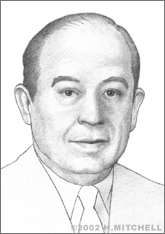John von Neumann
Mathematician John von Neumann was born in Budapest, Hungary in 1903. As a very young child, he impressed the people around him with his incredible memory. It was said that he could memorize pages of the phone book and divide 8-digit numbers in his head by the age of six. He was recognized as the best math student in Hungary in 1921. In 1925, he received his bachelor's degree in chemical engineering from the Swiss Federal Institute of Technology (Technische Hochschule) in Zurich, and in 1926, he completed his doctoral degree in mathematics at the University of Budapest.
In 1930, von Neumann was invited to the United States to teach at Princeton University. He settled there, became a U.S. citizen, and spent a great deal of time during the course of his career moving among Princeton, New Jersey; Los Alamos, New Mexico; and Washington D.C. In 1933, Princeton established the Institute for Advanced Studies and asked von Neumann to be one of its original six professors of mathematics. He accepted the offer, and he retained this position for the rest of his life.
During World War II, von Neumann worked at Los Alamos on the development of nuclear weapons and energy. He also worked a great deal with early computers and began to see potential in new and more efficient designs for these groundbreaking machines. After the war, in 1945, von Neumann drafted a report and machine description that led to the construction of the EDVAC, or Electronic Discrete Variable Automatic Computer. Von Neumann's report marked the first conceptualization of the stored-program computer. (It should be noted that in 1946, Maurice Wilkes of Cambridge University's Mathematical Laboratory designed a machine that would officially become the world's first operational stored-program computer.)
Von Neumann was credited as one of the first to see computers as devices that could be used to solve specific problems through applied mathematics. His work with the Los Alamos group helped to develop synergy between computers' capabilities and the need for computational solutions to nuclear problems. His work is said to have accelerated the development of the hydrogen bomb.
Von Neumann's accomplishments in the field of mathematics sealed his place in history as one of the great mathematicians of our time. He established Game Theory, built the foundations for quantum mechanics, and proved what is known as the Minimax Theory. After the war, in the 1950s, von Neumann consulted for IBM on various technological projects. He was a member of the Navy Bureau of Ordnance from 1941 to 1955 and a consultant to the Los Alamos Scientific Laboratory from 1943 to 1955. From 1950 to 1955, he was a member of the Armed Forces Special Weapons Project in Washington, D.C. In 1955, President Eisenhower appointed him to the Atomic Energy Commission.
Neumann was diagnosed with cancer and died 18 months later on February 8, 1957.


